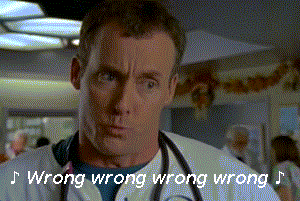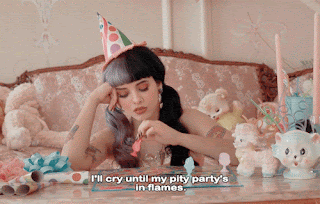It's not easy for a stubborn person to admit when they're wrong. I know this, because I know many stubborn folk, for whom the idea of holding their hands up and saying "okay, I was wrong and I'm sorry" is the kind of thing that causes them to wake up in the dead of night, in a cold sweat.
I also know this, because to a much lesser extent, I am a stubborn person.
I know that when I have a bee in my bonnet about something, I become rather unshakable in my views. I know that I tend to react strongly to perceived slights, because I'm ludicrously sensitive and then afterwards, I struggle to let go of the hurt I've felt, in order to see the person who hurt me the way I saw them before. I know that there have been times when I've decided that I'd rather be silent and say nothing to someone, than have it out with them and fix a problem, because doing so feels too difficult. So, yeah, I guess I can be stubborn...
I like big BUTs and I cannot lie.
That's because I'm ridiculously self-analytical. To the point of actual craziness. I've been known to lie awake at night, wondering why I said a certain thing, or why I felt a certain way. And I don't just mean on the day a particular event or scenario happened. I mean weeks later. Months later. Years later (I talk about that a bit in this YouTube video).
I find myself wondering what I could have said instead. What I should have done differently. I start thinking about any other people involved in a situation and what their feelings on it all might be. And, if I think that they might be hurting because of something I've said or done, my gut instinct is to apologise and try to make it better. Not because I suddenly think I was in the wrong all along (although, sometimes I am, obviously), but because I know that the right thing to do, is to consider the feelings of others and to try to behave in a way that causes the least hurt.
Because, you see, you can be right and yet still be wrong.
I know, just... Hear me out.
But sometimes, arguments get unnecessarily heated. Other people get involved. Events escalate into something they never started out as. A petty dispute turns into World War Three.
That happened to me, six months ago.
I believe I had every right to be upset about something. But now, I also believe that I was very wrong to let it get as bad as it did. Someone in the situation should have said "hey, hang on, this is getting needlessly nasty. Let's cool off and meet up to talk about this properly in a couple of weeks." And in the absence of anyone saying that for those of us involved in the argument, perhaps I should have been the one to suggest it.
But I was stubborn. I was hurting. I was mad. So, I made no such suggestion. And things worsened. Soon, instead of anyone talking anything through, or making any effort to fix anything, I was unceremoniously told by someone who had zero place to be getting involved, that it was too late. Nobody wanted me around, anymore.
ALL ABOARD THE WOE IS ME TRAIN!
At that point, who was right or wrong in the situation was barely important, anymore. The fact is, a dumb, stupid argument that should have been talked through face to face, had destroyed several friendships. All because nobody thought to say "this is getting silly, now. Let's meet up to talk properly." Nobody, including me. So, whatever the right or wrong of the original argument, I was wrong, there. We were all wrong, there. And I hold my hands up and take responsibility for my lack of any action to save things. Because, regardless of whether or not I believe I was right to be hurt with various things, I was wrong to let those things - and the subsequent argument about them - destroy a really precious friendship. In fact, two really precious friendships.
The thing is, I think you can be right and still be wrong, if you go about things in a way that causes hurt, or if you allow a situation that could be fixed, to simply break down altogether.
And the more I thought about this whole "you can be right and still be wrong" thing, the more I realised it applies to a whole lot of different situations.
You see, sometimes, doing the right thing for other people, means doing the wrong thing for ourselves. And I bet that's something we're all guilty of.
Ever had someone ask something of you and felt duty-bound to do it, because you love that person and maybe they're in a position of need, so you go along with it, despite the fact that perhaps you could use a little help, yourself? You're doing the right thing for them, whilst perhaps doing the wrong thing for yourself.
We've all done it. Whether it's staying up late to talk to a friend with a problem, despite having an early shift at work the next day, or simply putting our own feelings second, because someone else needs to be priority, right now. We've all done the "right" thing for someone else, despite it actually being the "wrong" thing for us.
It's when you think of it like that, that you begin to realise that terms such as "right" and "wrong" are actually rather black and white. Reality has a far wider colour spectrum than that.
I suppose the most important things to remember are firstly that sometimes, we need to do right by ourselves. Putting your own feelings to one side is never a permanent solution, after all. And secondly, once we start analysing the way we really feel about things, we can see how our feelings have coloured our actions (or lack thereof) and - hopefully - confess to ourselves when we've contributed, whether knowingly or not, to a "wrong" situation.
You can be right and still be wrong.
You can do wrong for yourself, in order to do right for someone else.
Life is rarely ever black and white.







No comments:
Post a Comment
Drop me a line!
Note: only a member of this blog may post a comment.